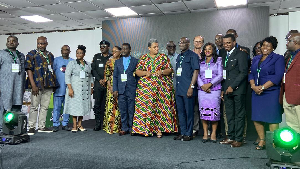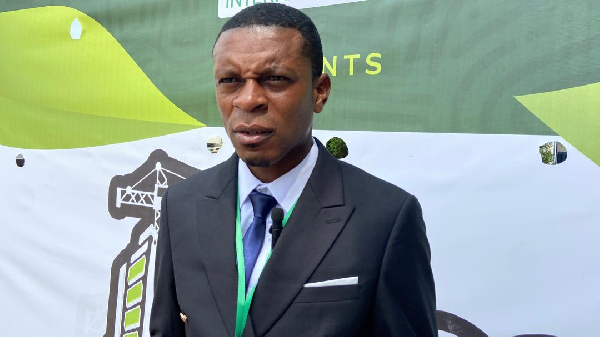 A photograph of stakeholders present at the event
A photograph of stakeholders present at the event
Stakeholders from government, academia, and the private sector gathered in Accra on Thursday June 26, 2025, for the 2025 REACO Conference under the theme “Resilient Infrastructure: Pragmatic Solutions for a Changing World.”
The event, organized by REACO International, brought together engineers, architects, urban planners, real estate developers, and policy experts committed to reimagining infrastructure for a more sustainable and disaster-ready future.
The High Commissioner of Barbados to Ghana, H.E. Juliet Bynoe-Sutherland, delivered a keynote highlighting Barbados’ unique approach to infrastructure development.
She emphasised that for small island developing states like Barbados, “every dollar has double duty it must build today’s infrastructure and prepare for tomorrow’s realities.”
According to her, resilience, inclusion, and sustainability are non-negotiable in every project whether public or private.
“Infrastructure must not only serve cities but also rural areas, not just the powerful but the vulnerable,” she stated, describing infrastructure as a “social contract.”
Barbados, which ranks among the top five countries in GDP and socio-economic development relative to its size, has used affordable housing and superior infrastructure as tools for stability and global competitiveness.
In a similar vein, Deputy Minister of Works, Housing and Water Resources, Gizella Tetteh-Agbotui, outlined Ghana’s comprehensive vision for infrastructure resilience through the government’s “Big Push” National Infrastructure Development Programme.
She stressed that the government is committed to rolling out robust, inclusive systems to withstand climate shocks and economic disruptions.
“Infrastructure today is not just about concrete. It’s about securing livelihoods, ensuring water access, facilitating commerce, and preserving dignity,” she said.
Major government-led initiatives include the District Housing Programme, urban flood resilience efforts such as the Greater Accra Resilient and Integrated Development (GARID) Project, and expanded water supply systems in both urban and rural communities.
The Deputy Minister also emphasised the role of public-private partnerships (PPPs), early warning systems, and climate-conscious designs as practical steps Ghana is taking to address future uncertainties.
Dr James Lindsay, President of the Ghana Real Estate Development Association and Chancellor of Cape Coast Technical University, added a passionate call for sustainability.
He challenged the construction sector to reduce deforestation by committing to reforestation. “Construction’s reliance on timber has environmental consequences,” he warned, announcing that JL Holdings is leading a project to plant 500,000 trees in Akroso to replenish forest reserves.
The academic sector was also represented, with Dr Mark Pim-Wusu of Accra Technical University speaking on behalf of Vice Chancellor Prof Amevi Acakpovi.
Dr Pim-Wusu who is the Head of the Department of Building Technology at ATU highlighted the significant infrastructural gaps across Africa and the need to train a skilled workforce to meet future demands.
“We must develop opportunities to stop the youth from risking their lives to seek greener pastures abroad. There is a progression path from certificate to master’s level that prepares our youth to fill these gaps,” he explained.
REACO International’s Executive Director, Ebenezer Duncan, called on stakeholders to embrace modern building technologies and ensure site suitability before construction.
“People must ensure their lands are not waterlogged before buying. Once it rains, it might be too late,” he cautioned.
Adding to the dialogue, Health and Safety Consultant Bigobiri Seidu Abdul Latif urged construction firms to prioritize worker safety through stringent medical checks and occupational health protocols.
“Neglecting safety standards violates labor laws and endangers lives,” he warned.
The conference continues through the week, featuring exhibitions, expert panels, and a field trip on June 28 to observe real-world resilient infrastructure projects in action.

AM/
GhanaWeb Special: The gold market that fuels galamsey
